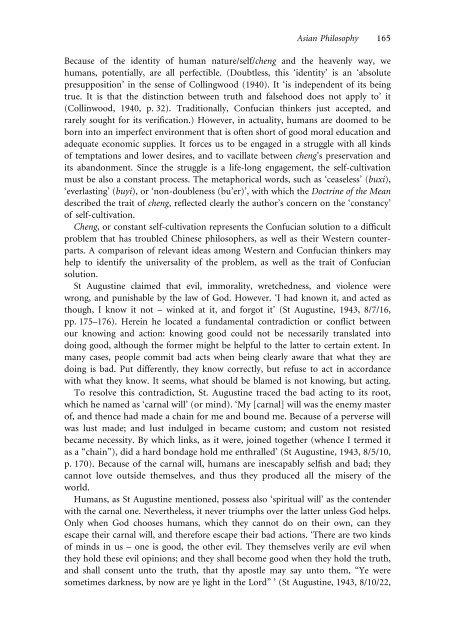Western sincerity and Confucian Cheng
Create successful ePaper yourself
Turn your PDF publications into a flip-book with our unique Google optimized e-Paper software.
Asian Philosophy 165<br />
Because of the identity of human nature/self/cheng <strong>and</strong> the heavenly way, we<br />
humans, potentially, are all perfectible. (Doubtless, this ‘identity’ is an ‘absolute<br />
presupposition’ in the sense of Collingwood (1940). It ‘is independent of its being<br />
true. It is that the distinction between truth <strong>and</strong> falsehood does not apply to’ it<br />
(Collinwood, 1940, p. 32). Traditionally, <strong>Confucian</strong> thinkers just accepted, <strong>and</strong><br />
rarely sought for its verification.) However, in actuality, humans are doomed to be<br />
born into an imperfect environment that is often short of good moral education <strong>and</strong><br />
adequate economic supplies. It forces us to be engaged in a struggle with all kinds<br />
of temptations <strong>and</strong> lower desires, <strong>and</strong> to vacillate between cheng’s preservation <strong>and</strong><br />
its ab<strong>and</strong>onment. Since the struggle is a life-long engagement, the self-cultivation<br />
must be also a constant process. The metaphorical words, such as ‘ceaseless’ (buxi),<br />
‘everlasting’ (buyi), or ‘non-doubleness (bu’er)’, with which the Doctrine of the Mean<br />
described the trait of cheng, reflected clearly the author’s concern on the ‘constancy’<br />
of self-cultivation.<br />
<strong>Cheng</strong>, orconstant self-cultivation represents the <strong>Confucian</strong> solution to a difficult<br />
problem that has troubled Chinese philosophers, as well as their <strong>Western</strong> counterparts.<br />
A comparison of relevant ideas among <strong>Western</strong> <strong>and</strong> <strong>Confucian</strong> thinkers may<br />
help to identify the universality of the problem, as well as the trait of <strong>Confucian</strong><br />
solution.<br />
St Augustine claimed that evil, immorality, wretchedness, <strong>and</strong> violence were<br />
wrong, <strong>and</strong> punishable by the law of God. However. ‘I had known it, <strong>and</strong> acted as<br />
though, I know it not – winked at it, <strong>and</strong> forgot it’ (St Augustine, 1943, 8/7/16,<br />
pp. 175–176). Herein he located a fundamental contradiction or conflict between<br />
our knowing <strong>and</strong> action: knowing good could not be necessarily translated into<br />
doing good, although the former might be helpful to the latter to certain extent. In<br />
many cases, people commit bad acts when being clearly aware that what they are<br />
doing is bad. Put differently, they know correctly, but refuse to act in accordance<br />
with what they know. It seems, what should be blamed is not knowing, but acting.<br />
To resolve this contradiction, St. Augustine traced the bad acting to its root,<br />
which he named as ‘carnal will’ (or mind). ‘My [carnal] will was the enemy master<br />
of, <strong>and</strong> thence had made a chain for me <strong>and</strong> bound me. Because of a perverse will<br />
was lust made; <strong>and</strong> lust indulged in became custom; <strong>and</strong> custom not resisted<br />
became necessity. By which links, as it were, joined together (whence I termed it<br />
as a “chain”), did a hard bondage hold me enthralled’ (St Augustine, 1943, 8/5/10,<br />
p. 170). Because of the carnal will, humans are inescapably selfish <strong>and</strong> bad; they<br />
cannot love outside themselves, <strong>and</strong> thus they produced all the misery of the<br />
world.<br />
Humans, as St Augustine mentioned, possess also ‘spiritual will’ as the contender<br />
with the carnal one. Nevertheless, it never triumphs over the latter unless God helps.<br />
Only when God chooses humans, which they cannot do on their own, can they<br />
escape their carnal will, <strong>and</strong> therefore escape their bad actions. ‘There are two kinds<br />
of minds in us – one is good, the other evil. They themselves verily are evil when<br />
they hold these evil opinions; <strong>and</strong> they shall become good when they hold the truth,<br />
<strong>and</strong> shall consent unto the truth, that thy apostle may say unto them, “Ye were<br />
sometimes darkness, by now are ye light in the Lord” ’ (St Augustine, 1943, 8/10/22,


